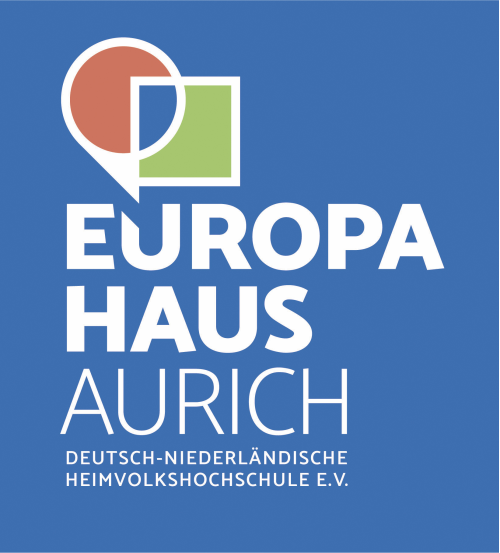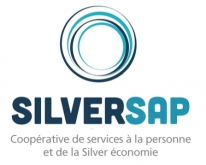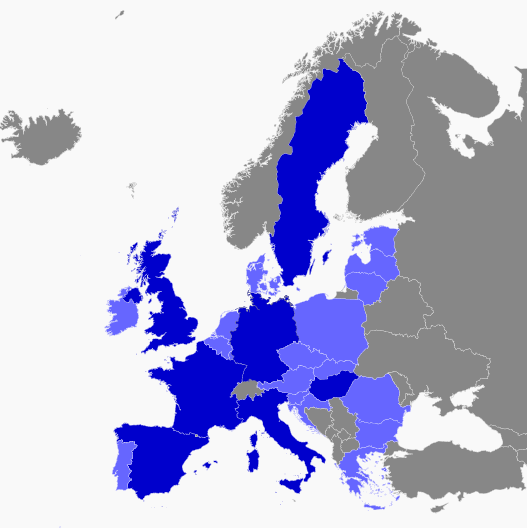 Europahaus Aurich is an adult education and civic education facilities in Aurich, the main city of the region of Eastern Frisia, right across the border ot the Netherlands. It has a hotel facility to accommodate up to 80 guests, and offers training events (typically week-long seminars and workshops) both for the people in the region and for international guests, youth and young adults being one of the most frequent users.
Europahaus Aurich is an adult education and civic education facilities in Aurich, the main city of the region of Eastern Frisia, right across the border ot the Netherlands. It has a hotel facility to accommodate up to 80 guests, and offers training events (typically week-long seminars and workshops) both for the people in the region and for international guests, youth and young adults being one of the most frequent users.
With the aim of reconciliation between Dutch and Germans, after the time of fascism and the resulting 2nd World War, the Europahaus Aurich was founded as an educational institution of the "Verein Deutsch-Niederländische Heimvolkshochschule e.V." in 1956. The organisations stands for German-Dutch cooperation, for a European perspective and democracy. The title "Europahaus" was added in 1970 to expresses our striving for a peaceful coexistence in Europe.
Europahaus Aurich is dedicated both to the region of Eastern Frisia and to international reconsiliation. It is committed to contributig to an ecologically, economically and socially sustainable future.
Europahaus Aurich is situated right in the centre of Aurich, on the grounds of several neighbouring houses once owned by wealthy families of the region.
Address
Website
https://www.europahaus-aurich.de/
Coopérative d'Activité et d'Emploi dans les Services A la Personne et la Silver Economie
COOP SAPSE Corsica is a cooperative providing business support programme for unemployed people in general and notably for disadvantaged women willing to (re)integrate the labour market or to create an economic activity. Its field of activy can be described as: Cooperative Activities and Employment in Human Services and Silver Economy.
Background
The creation of the first Cooperative for the Development of Employment in Services for People and the Silver Economy (COOP SAPSE) is part of an agreement signed by General Confederation of SCOP, the National Agency for Services to People (ANSP), the Ministry of Employment and Social Cohesion and Crédit Coopératif (bank of the enterprises of the social economy).
Its mission, that includes a test phase for entrepreneurs on a trial basis, has received support from:
- region of Corsica,
- COOP SAPSE - national network of cooperative in services to person sector,
- General Confederation of SCOP - production cooperative entreprises,
- Caisse de DĂ©pĂ´ts et Consignations (CDC) - French public financial institution and
- Macif foundation - foundation to encourage and support new research projects in the field of risk prevention.
COOP SAPSE Corsica has a county agreement and is positioned on the "comfort" services market, under the trade name of “Dolce Casa Services”: cleaning, ironing, small gardening or do-it-yourself, computer assistance, babysitting / child services…
COOP SAPSE Corsica aims at promoting economic initiative by enabling project managers to create business scale testing economic feasibility of their project while learning responsibility for their own activity and to better understand the functions of the entrepreneurs in real situations.
This social and economic innovation ensures reversibility and easy access to business creation.
Scope of Activities
More generally, COOP SAPSE Corsica activities are: • Coaching for creation and recovery of economic activity, • Implementation of a transitional phase of testing an economic activity (6-18 months) through a specific French contract, • Monitoring of individual activity during test phase (accompanying accounting, advance management, implementation of research funding, with the creation of the company ...), • Follow-up after creation by the entrepreneur, • Test of activity: business incubator, • Funding of social and solidarity economy.
Coaching Programme
COOP SAPSE’s activity includes a coaching programme aiming at developing specific social skills needed by managers (tasks execution, personal initiatives, ability to anticipate and respond effectively to change, cultural and social differences, leadership, management of emotions, ability to negotiate with others, learning new things/ innovations…).
Address
Les Terrasses du Fango - Batiment D
Rue du juge Falcone
20200 Bastia, Corsica, France
Tel. +33 603 615379
The city: San CristĂłbal de la Laguna
Canary Islands is an archipelago lying to the west of the African Western Sahara, and is one of the so-called outermost regions of the European Union. It´s 1200 km far from the mainland.
Main income is from tourism. Visitors can enjoy not just the weather and beaches, but also a great variety of natural areas. Canary Islands are one of the most extensively protected territories in Europe, with 42 per cent of the territory under some level of environment protection.
San Cristobal de La Laguna is a city and in the northern part of the island of Tenerife. With 150,000 inhabitants, the city is the third city in population of the region. La Laguna's historical center was declared a World Heritage Site by UNESCO in 1999.
According to data from National Institute of Statistics for the third quarter of 2018, the rate of unemployment was 18.56 %, which is more than seven percentage points above the national rate and second among all Spanish regions. Canary Islands have one of the highest rate of unemployment in EU.
The institution: CEPA San CristĂłbal
It is precisely on this context where CEPA San Cristobal provides its offer in adult education.
 The institution started in 1963 when the aim was to finish with the high levels of illiteracy in Spain. The town hall collaborated by providing facilities: first classrooms were located in the old seminary, primary schools, and others. When this campaign finished in 1973 programs of Adults' Lifelong Education (EPA) were organized. The centre started offering basic degrees training. In 1985 our offer increased with a variety of workshops related to typing, hairdressing , dressmaking, computer basic muse, etc.
The institution started in 1963 when the aim was to finish with the high levels of illiteracy in Spain. The town hall collaborated by providing facilities: first classrooms were located in the old seminary, primary schools, and others. When this campaign finished in 1973 programs of Adults' Lifelong Education (EPA) were organized. The centre started offering basic degrees training. In 1985 our offer increased with a variety of workshops related to typing, hairdressing , dressmaking, computer basic muse, etc.
Since 2000 CEPA San Cristobal is located in a main central building and a wide net of auxiliar spaces. Since then other studies have been added, such as Nursing and English distance learning. Nowadays, CEPA San Cristobal has increased the number of external classrooms due to the growing amount of adult learners that register for a course every year.
Scope of Activities
- Basic literacy targeted to elder early school leavers. (9 groups)
- Secondary basic degree training, required either for professional purposes or to continue studying further training programs. (21 groups)
- VET course for Assistants in Nursing. (2 groups)
- English as a foreign language. (4 groups)
- Access course to vocational training for adults with experience but without suitable qualifications . (3 groups) Number of students (2019): 950
Staff:
- 19 full time teachers
- 36 part time teachers (figures from 2019)
Contact:
Tel. +34 922 260656
E.mail: This email address is being protected from spambots. You need JavaScript enabled to view it.
Website: http://www3.gobiernodecanarias.org/medusa/edublog/cepasancristobal/
Nevelők Háza Egyesület (NHE), or in English: Educators’ Centre Association, is one of the leading NGOs of Hungary, operating numerous projects and a community centre in the city of Pécs in cooperation with the local municipality.
Location
PĂ©cs is the fifth largest city in Hungary, located on the slopes of the Mecsek mountains in the South-West part of the country, close to its border with Croatia. It is the administrative and economical centre of Baranya county. It has around 140 000 inhabitants.
PĂ©cs has always been a multicultural city where many cultural layers are encrusted melting different values of the history of two thousand years. Hungarians, Croatians and Swabians still live in peace together in economic and cultural polarity.
In 1998 Pécs was given the UNESCO prize “Cities for peace” for maintaining the cultures of the minorities, and also for its tolerant and helping attitude toward refugees of the Balkan Wars.
In 2010 PĂ©cs was selected to be the European Capital of Culture sharing the title together with Essen and Istanbul. in 2017 PĂ©cs won the award of UNESCO Global Learning Cities. Still the region is among the 20 economically most under-developed regions of the EU.
Mission
NHE’s aims are to support the civil grass-root movements with its internal and external resources in order that they can grow and strengthen, be more active and by doing so they can encourage the growth of their closer and wider surroundings. NHE provides services, training activities and educational programmes according to the principles of sheltering, counselling, empowerment and organizational development as well as lifelong learning priorities.
History
NHE was founded in 1993, and has been working for the development of the civil society for the last 26 years. Since 1997 the organization sustains the House of Civic Communities that helped to launch several local civil organizations. Currently more than 90 communities - formal and non-formal civil movements - are operating in the building, while NHE acts as an umbrella organisation for their benefit. Besides its infrastructural capabilities, NHE provides services and learning possibilities for the NGOs, training activities, forums, research, conferences, professional consultancy, etc. Over 50 000 visitors were registered in 2018.
Major Activities
The Association currently performs the following major functions:
- Providing consultancy and organizational development activities for non-governmental organizations as regional Civil Centre;
- Operating the Baranya County Volunteer Centre for local volunteers and host organizations as well as a community café as the association's social enterprise;
- Organizing cultural and society events, exhibitions, concerts, performances for the local audience;
- Providing non-formal learning occasions for seniors, adults, disadvantaged groups (e.g. single mothers, Roma, disabled, etc.);
- Coordinating every year the Learning City Festival of PĂ©cs (UNESCO Global Learning City Awarded) in cooperation with the municipality of PĂ©cs, the University of PĂ©cs and several local and regional NGOs, for-profit actors and other social, cultural, educational, environment protection, etc. institutions;
- Participating in and managing several national and international projects.
Cooperation
NHE has managed several national and international EU funded projects as well since years. NHE maintains a 20-year-old fruitful working relationship with the Municipality of PĂ©cs and carries out public services and functions for nearly 20 years.
Staff and Volunteers
The everyday work is regularly assisted by more than fifty volunteers and 19 employees.
Memberships
NHE is the member of some international networks like EAEA, REIN, as well as national ones like proHáló Network, Civil Centres in Hungary, Network of Volunteer Centres.
Address
Nevelők Háza Egyesület
Szent István tér 17
7624 PĂ©cs,Hungary
Tel.: +36 (0)72 215543
E-mail: This email address is being protected from spambots. You need JavaScript enabled to view it.
Website: www.ckh.hu/nevelok-haza-egyesulet
Subcategories
Other Projects
The eight organsiations running the HYS project are also active in other Erasmus+ projects. Here we present a selection of them.
Page 1 of 3













